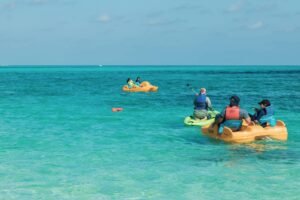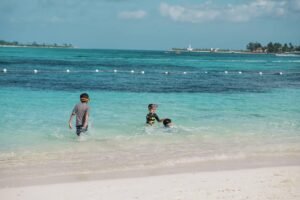A Journey of Success: Sunnahs of Travel
The beautiful way of life of our beloved Prophet Muhammad ﷺ–through everything he had done, said or admitted–is considered a Sunnah. By following the sunnahs, we can make the conscious choices of leading a more fruitful life of intention, success and rewards.
Upon travel, Prophet Muhammad ﷺ had simple habits he performed to make his journey more beneficial and connected to Allah swt. Here is a compilation of Hadith pertaining to travelling, which you can instill in your life to make it your vacation more meaningful and spiritually uplifting, inshallah.
Sunnahs of Travels:
- Prophet Muhammad ﷺ has said that travelling is a means of acquiring good health (Kanzul Ummal – 2:196).
- Although Prophet Muhammad ﷺ commence a journey on other days, he also preferred beginning a journey on a Thursday. (Bukhari 2:197)
- Prophet Muhammad ﷺ preferred commencing his journey after Fajr Salah. i.e. before Ishraaq time which begin at +/- minutes after sunrise
- Prophet Muhammad ﷺ had said that the day of Jumu’ah does not stop one from travel as long as the time of Jumu’ah Salah does not enter, ie travelling before Zawaal (midday) is permissible (Kanzul Ummal 2:200)
- Prophet Muhammad ﷺ has said that one should seek out:
- The neighbour before the house;
- The travelling companion before journey;
- To start the journey after making arrangements for expense (Ithaf 2:203)
- One should carry food provisions for the journey (Bukhari 2:206)
- To read two rakat (or four rakats) of Nafl Salah before setting out on a journey (Majma ‘uzZawaid 2:205)
- Prophet Muhammad ﷺ discouraged setting out alone on a journey (Ahmad 2:204)
- Prophet Muhammad ﷺ has advised to appoint an Amir (leader) when several people are travelling together (so that decisions could be easily reached after mutual consultantion) (Abu Dawad 2:211)
- The one appointed as Ameer should have the following qualities, he should be:
- Pious;
- Learned (aalim);
- Well-mannered (of good character);
- Soft natured;
- Preferring others to his own needs
- To request the one going on a journey for du’as (Tirmidhi 2:211)
- To keep the following items on a journey:
- Comb;
- Miswak;
- Stick for scratching the back;
- Mirror;
- Surma (Baihaqi 2:212)
- Prophet Muhammad ﷺ has said that whilst on a journey one’s posessions will be protected if one reads the following after making a circle around it:
Allahu Rabbi La Sharika Lahu
“Allah is my Sustainer, He has no partner.” - Whilst on a journey Prophet Muhammad ﷺ used to reach shorter Surahs in Salah Abu Dawud 2:219)
- To read Nafl (optional) Salah whilst sitting on one’s mode of transportation, facing the direction in which one is moving (Bukhari 2:221)
- To fast and not to fast on a journey is also Sunnah (Bukhari 2:223)
- Prophet Muhammad ﷺ has encouraged the helping of one’s companions whilst on a journey. Some of the rewards mentioned are:
- Reward of Sadaqah;
- Reward of Nafl fast;
- Better than all optional acts of worship except martydon (SK 2:224-225) NOTE: Any and every type of help merits the above reward, eg, helping in carrying the goods of another, cooking, cleaning up, etc.
- To meet and greet one’s friends and relatives before departing on a journey (Majma uz-Zawaid 2:238)
- To accompany the departing traveller for a short distance and to advise and make du’a for him (Hakim 2:232)
- To engage in Zikr (remembrance of Allah) during a journey (Kanzul ‘Ummal 2:242)
- Before setting out on a journey one should meet one’s friends and relatives who should make du’a for him in the following words:
As-taudi ‘ullaha Deenaka Wa Amaanataka Wa Khawaatiima ‘Amalika“I hand over to Allah your deen, your trustworthiness and your end result.” (Abu Dawud 2:266)And he (the traveller) should reply with the follwing du’a:As-taudi ‘ukumul-laahal-ladhi La Tudii’u Wa Da’i ‘uhu“I entrust (hand) you to that Allah whose trust is not lost (ie, Who does not lose his trust) (SK 2:267)
- When leaving home on the commencement of a journey one should read the following du’a:
Bimillahi Tawakkaltu ‘Alal-lahi Wala Hawla Wala Quwwata Illah Billah
“In the name of Allah, I trust in Allah, there is no power and might except from Allah” (Tirmidhi)Also read the following Du’a:
Allahumma Antas-saabihu Fis-safari Wal Khaleefatu Fil Ahli
Allahumma Inna A’udhubika Minad-dubnati Fis-safari Wal Ka’bati Fil Munqalabi
Allahhummaqbid Lana Arda Wa Hawwin ‘Alainas-safara
“O Allah! You are my companion in my journey and (after me) my guardian of my family”
“O Allah! I seek your protection from difficulty in the journey and an evil return”
“O Allah! Shorten the earth (distance) for us and make the journey easy” (SK 2:261) - When one boards any vehicle, he should recite:
Bismillah, “In the name of Allah” (SK 2:268) - When seated, he should recite:
Alhamdulillah, “All praise is due to Allah” (SK 2:268Thereafter one should read the following du’a:
Subhanalladhi Sakharalana Haadhaa Wamaa Kunaa Lahu Muqrineen Wa Inna Ila Rabbinaa Lamunqaliboon
“Purity belongs to Allah, who has subjected this conveyance for us and we were not capable of controlling it and, surely, to our Sustainer we are to return” (SK 2:269) - Thereafter one should read each of the following three times:
Alhamdulillah, “All praise is due to Allah”
Allahu Akbar, “Allah is the greatest”
La Ilaha Illallaah, “There is none worthy of worship but Allah.”Thereafter one should read the following Istaghfar:
Subhanaka Inni Zalamtu Nafsil Faghfirli Innahuu Laa Yaghfirudh-dhunaba Illa Anta“Purity belongs to You. Surely I have wronged myself so forgive me. Indeed none forgives sins besides You.” (Mishkat 2:268)
- When one ascends or attempts to reach any height, one should say:
Allahu Akbar, “Allah is the greatest” - When descending from any height, one should say:
Subhanallah, “Purity belongs to Allah” - When one slips or experiences an accident, one should say:
Bismillah, “In the name of Allah”(Abu Dawud 2:276-277) - When travelling on a ship, boat, canoe, or other floating device, one should read:
Bismillahi Majriiha Wa Mur-saaha Inna Rabbi Laghafurur-Rahim
“In the name of Allah, it is sailing and anchoring. Surely my Rabb is Most Forgiving and Most Merciful” (SK 2:276) - When stopping en route at any place, one should read:
A ‘udhu Bikalimaatil-laahit-taamaati Min Sharri Maa Khalaq”
“I seek refuge in the perfect words of Allah from the evil of that which He has created” - When one enters any village, town, settlement, etc, one should read three times:
Allahumma Baarik Lanaa Fiha
“O Allah! Bless us in this (village, town, settlement, etc)”Thereafter, read the following dua:
Allahummar-zuqnaa Janaahaa Wa Habbibnaa Ilaa Ahlihaa Wa Habbib Saalihi Ahlihaa Ilainaa
“O Allah! Bless us with its fruits and create our love in the hearts of its inhabitants and love for their pious in our hearts” (Majma ‘uz-Zawdid 2:279) - Upon reaching one’s destination, one should read:
Rabbi Anzilnee Munzalam Mubarakaw Wa Anta Khairul Munzileen
“My Rab caused me to set foot on a blessed land and you are the best of those who bring me to this land.” - Upon returning from a journey, one should read:
A’ibunaa Ta’ibunaa ‘Abidunaa Saajidunaa Lirabbinaa Hamiduun
“We are returners, of those who repent and are worshippers and prostrators and those who praise our Rabb.” - When one sets eyes upon one’s town, village, settlement, etc, one should say:
Allahummaj-’al Lanaa Bihaa Qararaw Wa Rizqan Hasana
“O Allah, make for us in it a place of staying and grant us good rizq (sustenance)”
(SK 2:277) - En route, if one breaks one’s journey then when one recommences, to read two rakats Nafl Salah.
- Prophet Muhammad ﷺ is reported to have said that the most suitable time to return home from a journey is the very early part of the night (Abu Dawud 2:228)
- Prophet Muhammad ﷺ has encouraged the bringing of gifts for one’s family when returning from a journey (SK, 2:231)
- When returning home from a journey, read two rakat of Nafl Salah (Bukhari 2:234)
- Prophet Muhammad ﷺ used to meet even the children when returning from a journey (Mishkat 2:235)
- To display kindness and compassion towards the fellow travellers.
- When reading Fard (compulsory) Salah on a journey, to call out both the Adhan and the Iqamah (Tirmidhi 2:217)
- Whilst on a journey, to not unnecessarily omit the Sunnah and Nafl Salah (Tirmidhi 2:218)Prophet Muhammad ﷺ would not leave out the 2 Rakats after Maghrib Salah and the 2 Rakats before the Fard of Fajr Salah, whether at home or on a journey (SK 2:219)
- Prophet Muhammad ﷺ would not leave out the 2 Rakats after Maghrib Salah and the 2 Rakats before the Fard of Fajr Salah, whether at home or on a journey (SK 2:219)












